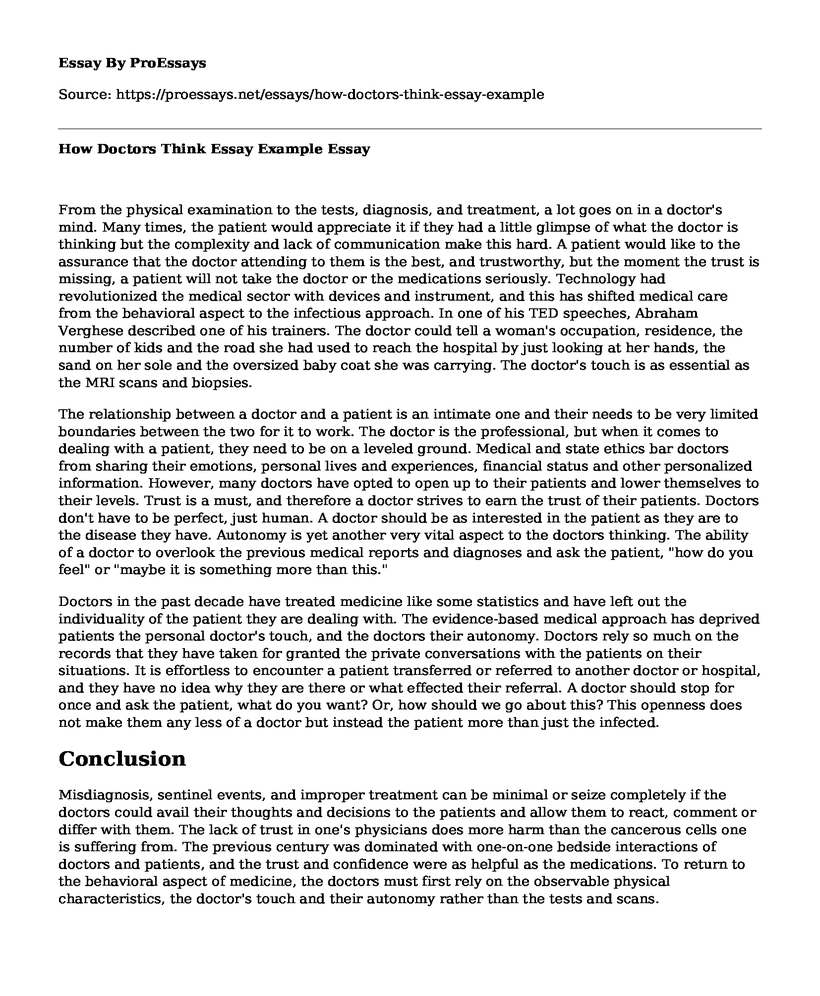From the physical examination to the tests, diagnosis, and treatment, a lot goes on in a doctor's mind. Many times, the patient would appreciate it if they had a little glimpse of what the doctor is thinking but the complexity and lack of communication make this hard. A patient would like to the assurance that the doctor attending to them is the best, and trustworthy, but the moment the trust is missing, a patient will not take the doctor or the medications seriously. Technology had revolutionized the medical sector with devices and instrument, and this has shifted medical care from the behavioral aspect to the infectious approach. In one of his TED speeches, Abraham Verghese described one of his trainers. The doctor could tell a woman's occupation, residence, the number of kids and the road she had used to reach the hospital by just looking at her hands, the sand on her sole and the oversized baby coat she was carrying. The doctor's touch is as essential as the MRI scans and biopsies.
The relationship between a doctor and a patient is an intimate one and their needs to be very limited boundaries between the two for it to work. The doctor is the professional, but when it comes to dealing with a patient, they need to be on a leveled ground. Medical and state ethics bar doctors from sharing their emotions, personal lives and experiences, financial status and other personalized information. However, many doctors have opted to open up to their patients and lower themselves to their levels. Trust is a must, and therefore a doctor strives to earn the trust of their patients. Doctors don't have to be perfect, just human. A doctor should be as interested in the patient as they are to the disease they have. Autonomy is yet another very vital aspect to the doctors thinking. The ability of a doctor to overlook the previous medical reports and diagnoses and ask the patient, "how do you feel" or "maybe it is something more than this."
Doctors in the past decade have treated medicine like some statistics and have left out the individuality of the patient they are dealing with. The evidence-based medical approach has deprived patients the personal doctor's touch, and the doctors their autonomy. Doctors rely so much on the records that they have taken for granted the private conversations with the patients on their situations. It is effortless to encounter a patient transferred or referred to another doctor or hospital, and they have no idea why they are there or what effected their referral. A doctor should stop for once and ask the patient, what do you want? Or, how should we go about this? This openness does not make them any less of a doctor but instead the patient more than just the infected.
Conclusion
Misdiagnosis, sentinel events, and improper treatment can be minimal or seize completely if the doctors could avail their thoughts and decisions to the patients and allow them to react, comment or differ with them. The lack of trust in one's physicians does more harm than the cancerous cells one is suffering from. The previous century was dominated with one-on-one bedside interactions of doctors and patients, and the trust and confidence were as helpful as the medications. To return to the behavioral aspect of medicine, the doctors must first rely on the observable physical characteristics, the doctor's touch and their autonomy rather than the tests and scans.
Cite this page
How Doctors Think Essay Example. (2022, Jun 06). Retrieved from https://proessays.net/essays/how-doctors-think-essay-example
If you are the original author of this essay and no longer wish to have it published on the ProEssays website, please click below to request its removal:
- Survey to Assess Role of Nursing Care on Geriatric Patients That Are Suffering From Dementia
- Pediatric Nursing Practice Growth and Development - Essay Sample
- Adolescents, Drugs, and HIV Risk: A Study in Oregon and Mexico - Essay Sample
- Progressive Brain Disease: Alzheimer's Disease (AD) Symptoms & Signs - Essay Sample
- Essay Example on Criminology Theories and Their Relevance to CBP Careers
- Paper Example on Portfolio: Private, Personal & Confidential Info
- Leadership Learning Experience: A Vital Tool in Nursing - Essay Sample







